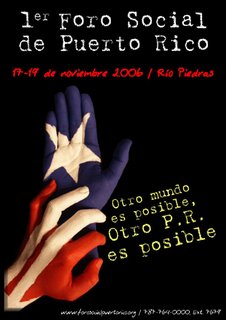Globalise Not!
Wednesday, November 29, 2006
Wednesday, November 22, 2006
IMF: Let Us Watch Your Foreign Exchange
Japan rebuffed a U.S. campaign to introduce a foreign exchange surveillance role for the International Monetary Fund.Washington is attempting to enlist the IMF to police foreign exchange rates and get Asian countries to loosen controls on currencies that American policy makers say are fueling a record U.S. trade deficit.
But Japan and China have opposed any effort to give the IMF the power to blame any particular nation or region for lopsided flows of trade and investment.
"It's not appropriate for the IMF to discuss levels of foreign exchange rates," the Japanese finance minister, Koji Omi, told a news conference in Melbourne following a meeting of Group of 20 finance chiefs and central bankers.
Foreign exchange rates "are currently being determined by market forces," he added.
Robert Kimmitt, deputy secretary at the U.S. Treasury, said Friday in Melbourne that there "is now broad consensus the IMF needs to improve its surveillance, particularly over exchange rates. This means rewriting the IMF rules on exchange rate surveillance."
G20 finance ministers and central bankers discussed the IMF's role in policing exchange rates "with the greatest caution," Finance Minister Peer Steinbrück of Germany said Sunday. "Such a review, which should have as a goal that foreign exchange rates should be strongly market-driven, cannot be the subject of political speculation or action," Steinbrück said.
The heads of the three U.S. automaking companies last week pressed President George W. Bush to take action on the yen, saying that the Japanese currency was artificially low and impeding their recovery.
The Detroit automakers maintain that a "systemically undervalued" yen is helping Japan maintain a "significant" automotive trade-balance surplus, Rick Wagoner, chief executive of General Motors, said Tuesday.
GM, Ford Motor and DaimlerChrysler's Chrysler unit have all been posting losses this year as they continue to shed U.S. market share to Japanese automakers like Toyota Motor and Honda Motor.
The yen is at its lowest level against the currencies of Japan's biggest trading partners since 1985, according to a Bank of Japan index.
The currency's 5.2 percent decline against the dollar and a 5.5 percent drop versus the euro over the past six months have helped drive the country's longest postwar economic expansion.
Separately, 48 percent of 46 traders, strategists and investors surveyed by Bloomberg before the weekend G-20 meeting advised buying the dollar against the yen this week. Forty-six percent recommended buying the dollar versus the euro.
Technorati Tags: IMF, Japan and ForeignExchange.
Monday, November 20, 2006
Violence Seals Fate of Doomed G20 Meeting
Ugly violence from 20 activists disrupted the otherwise peaceful protest. About 20 activists overturned a police barricade, threw bottles and broke into a police riot truck, smashing its windows.They also kicked the legs of police horses. The violence took place well away from the venue, with police locking down parts of the city to stop protesters actually reaching the meeting.

Charity group Oxfam says the leaders at the G20 Summit must commit to improving foreign aid and slashing the debts of developing countries.
The finance ministers and central bank governors of the world's 20 richest economies are in Melbourne for the second and final day of the summit.
Discussions will cover reforms to the International Monetary Fund (IMF) and the effectiveness of foreign aid arrangements.
Oxfam's executive director Andrew Hewett says rich countries like Australia must increase their aid budgets and offer debt relief.
"The Government in Canberra has been stingy," he said.
"Australia ranks 19th out of 22 rich countries and the only reason we can talk about the aid budget going up is because it was cut to smithereens after this Government came to power."
Tuesday, November 14, 2006
World Social Forum

The World Social Forum is an open meeting place where social movements, networks, NGOs and other civil society organizations opposed to neo-liberalism and a world dominated by capital or by any form of imperialism come together to pursue their thinking, to debate ideas democratically, for formulate proposals, share their experiences freely and network for effective action. Since the first world encounter in 2001, it has taken the form of a permanent world process seeking and building alternatives to neo-liberal policies. This definition is in its Charter of Principles, the WSF’s guiding document.
Here are the schedules of the WSFs for 2006 in your area.
Puerto Rico Social Forum
Date: November 17th to 19th, 2006
Venue: Rio Píedras, Porto Rico
G20 Alternative Forum (Melbourn Social Forum Organisation)
Date: November 19th, 2006
Venue: Melbourne, Australia
Chile Social Forum
Date: November 25th and 26th 2006
Venue: Santiago, Chile
Technorati Tags: WorldSocialForum, WSF and G20.
